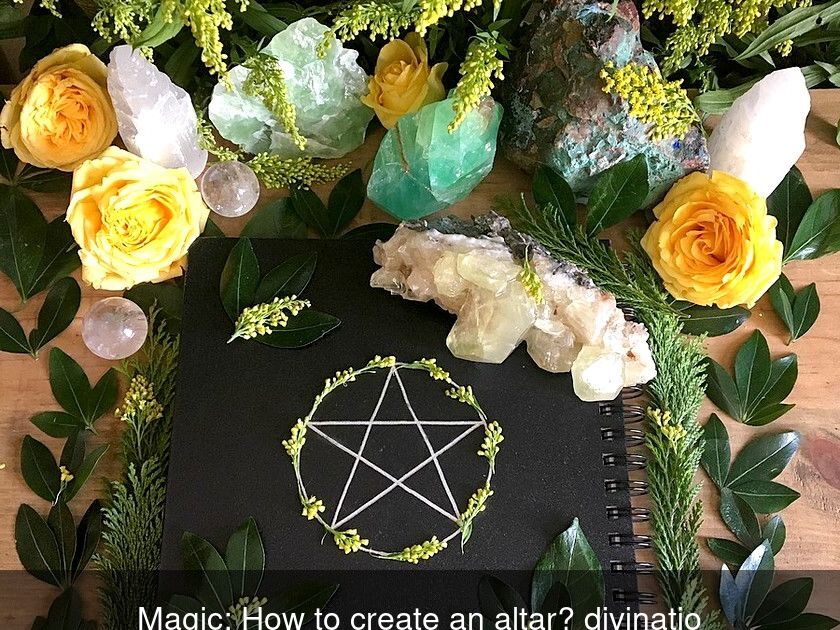Magic: How To Create An Altar?
If you are interested in magic and want to practice rituals at home, you can start by creating an altar, which is a domestic shrine. This small personal sanctuary will allow you to create a sacred space in your home and reconnect with yourself and your deepest intentions.
What is an altar?
With the growing enthusiasm of the general public for Wicca, building an altar at home has become a trend.
It is not necessary to be a believer to create an altar as you can design it as a place for meditation, prayer, magical practices, offerings, or even as an altar in memory of your ancestors.
In any case, it is about creating a place that reflects who you are and rejuvenates you. This space, meant to reflect your inner landscape, can simply be used to display images and objects that you love and that remind you of your deepest aspirations.
Where should it be installed?
The first step to creating an altar is to choose the location for your altar. Choose a place that you like and that is easily accessible in your home, so that you can see it at any time and use it for your rituals.
Prefer a quiet place, away from traffic and agitation. It can be a corner of your bedroom, your living room, or even your garden.
Once you have found the right location, start by clearing this space of any clutter. Purify it with Himalayan salt or by practicing a smudging with Sage or lavender to cleanse the atmosphere of negative energies.
How to arrange it?
Your altar does not need to be very large: it can be set up on a tray, on the mantle of a fireplace, or on a shelf in your room. Just make sure to choose a stable support, whether it's a coffee table or a shelf.
Since dust and dirt attract negative energies, you must ensure that your altar always remains clean. That's why it is usually covered with a decorative fabric (like a nice tablecloth, a piece of silk, or a simple sheer curtain) that protects it.
A classic sacred altar generally includes elements symbolizing the four elements fire, air, water, and earth. The fifth element, ether, is invisible and present everywhere.
So, you can arrange on your altar:
• one or more candle(s) in the south for the fire element
• a small bowl of water, a seascape, or a seashell in the west for the water element
• a pebble, a stone, salt, clay object, or potted plant in the north for the earth element
• incense or a feather in the east for the air element.
If you use a bowl of water to symbolize this element, remember to change it every day to avoid stagnant water, but don't waste it! Use it to water a plant, for example.
How to fill it?
You can also decorate this altar with texts or images that help you achieve a mental, emotional, and spiritual state conducive to your rituals.
Take advantage of this dedicated space to arrange the materials you use for your rituals, for example:
• dried herbs, such as sage, rosemary, or laurel
• crystals corresponding to your intentions
Note: each crystal has its own properties and virtues. Amethyst promotes serenity, citrine brings joy and abundance, Moonstone develops intuition and femininity, while rose quartz symbolizes love and tenderness.
• elements respectfully gathered from nature, such as feathers, driftwood pieces, flowers that you can place in a small wooden or ceramic bowl.
• paper and a pencil to write formulas and mantras
• photos of happy memories
• decorative figurines
Is it allowed to customize it?
It is up to you to customize your altar as you wish, according to your desires and the seasons.
This personal space can be either stripped down and minimalist for meditation and prayer, or on the contrary, be rich in many symbols and memories.
Do not be afraid to make mistakes in setting up your altar. There is no wrong way to do it, since this place should above all be beautiful and inspiring to you.
This small personal sanctuary is intended to soothe and inspire you. It can help you in your personal development, in your spiritual practice, and contribute to developing your intuition.
To set up your altar, be authentic, creative, and enjoy yourself!
How to use it?
You don't need to be a believer or practitioner of a particular religion to offer prayers at your altar.
Prayer allows you to ask for healing for yourself or your loved ones, seek forgiveness, or request assistance before making an important decision.
At your altar, you can also practice meditation, positive visualization, recite mantras, or make offerings such as burning incense or a candle.
Candles are essential as rituals generally begin by lighting a candle and end by blowing it out and cleaning the altar.
Whether you sit cross-legged or kneel, consider adding a cushion in front of your altar to comfortably settle during your prayers or other rituals.



